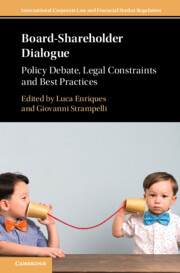Book contents
- Board-Shareholder Dialogue
- International Corporate Law and Financial Market Regulation
- Board-Shareholder Dialogue
- Copyright page
- Contents
- Contributors
- Foreword
- The Dialogue between Corporations and Institutional Investors
- 1 The New Corporate Governance
- 2 Shareholder Voice and Corporate Purpose
- 3 The Purpose of Corporate Purpose Statements
- 4 Systemic Stewardship with Tradeoffs
- 5 Giant Asset Managers, the Big Three, and Index Investing
- 6 Something Old, Something New
- 7 The Perils and Promise of Shareholders as Stakeholder Advocates
- 8 How to Facilitate ESG Investor Engagement
- 9 Emerging ESG-Driven Models of Shareholder Collaborative Engagement
- 10 ESG and Board-Shareholder Engagement in M&A
- 11 How Does Board-Shareholder Engagement Really Work?
- 12 Shareholder Engagement inside and outside the Shareholder Meeting
- 13 The Viability of Blockchain in Corporate Governance
- 14 Shareholder Engagement in East Asia
- 15 Board-Shareholder Engagement and Directors’ Appointments
- 16 Shareholder Proposals and the Debate over Sustainability Disclosure
- 17 Board-Shareholder Engagement and Disclosure Obligations under Corporate Governance Codes
- 18 Board-Shareholder Engagement and Insider Regulation
- 19 Market Soundings Rules
2 - Shareholder Voice and Corporate Purpose
The Purposelessness of Mandatory Corporate Purpose Statements
Published online by Cambridge University Press: aN Invalid Date NaN
- Board-Shareholder Dialogue
- International Corporate Law and Financial Market Regulation
- Board-Shareholder Dialogue
- Copyright page
- Contents
- Contributors
- Foreword
- The Dialogue between Corporations and Institutional Investors
- 1 The New Corporate Governance
- 2 Shareholder Voice and Corporate Purpose
- 3 The Purpose of Corporate Purpose Statements
- 4 Systemic Stewardship with Tradeoffs
- 5 Giant Asset Managers, the Big Three, and Index Investing
- 6 Something Old, Something New
- 7 The Perils and Promise of Shareholders as Stakeholder Advocates
- 8 How to Facilitate ESG Investor Engagement
- 9 Emerging ESG-Driven Models of Shareholder Collaborative Engagement
- 10 ESG and Board-Shareholder Engagement in M&A
- 11 How Does Board-Shareholder Engagement Really Work?
- 12 Shareholder Engagement inside and outside the Shareholder Meeting
- 13 The Viability of Blockchain in Corporate Governance
- 14 Shareholder Engagement in East Asia
- 15 Board-Shareholder Engagement and Directors’ Appointments
- 16 Shareholder Proposals and the Debate over Sustainability Disclosure
- 17 Board-Shareholder Engagement and Disclosure Obligations under Corporate Governance Codes
- 18 Board-Shareholder Engagement and Insider Regulation
- 19 Market Soundings Rules
Summary
In "Prosperity," Professor Colin Mayer proposes a corporate law change, advocating for social goals in company constitutions. The chapter, however, argues this requires more than a legal tweak. Analyzing two cases, it suggests shareholders resisting profit restrictions under Friedman’s principle pose challenges. Insights from French corporate statements, US reactions to Public Benefit Corporation proposals, and UK companies’ responses reveal hurdles. Proposed solutions include reducing shareholder powers or court-specified purposes. In the second case, exploring investors prioritizing non-financial goals, the chapter considers Environmental, Social, and Governance (ESG) investing. Despite alignment potential, current ESG falls short. Uncertainty surrounds its future. If successful, the chapter contends existing corporate law can accommodate goals without a mandatory purpose. In summary, it suggests the mandatory purpose requirement may be ineffective in the first case or largely unnecessary in the second, highlighting the complexities in reshaping corporate conduct.
- Type
- Chapter
- Information
- Board-Shareholder DialoguePolicy Debate, Legal Constraints and Best Practices, pp. 46 - 90Publisher: Cambridge University PressPrint publication year: 2024



